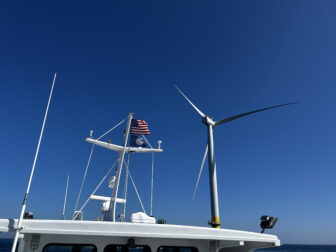James Hansen recently sent this letter out to his email list regarding the Wise County protest:
Obstruction of Justice
“You’re Hannah, right?” Hannah Morgan, a 20-year old from Appalachia, Virginia, was one of 11 protesters in handcuffs early Monday morning September 15 at the construction site for a coal-fired power plant being built in Wise County Virginia by Dominion Power. The handcuffs were applied by the police, but the questioner, it turns out, was from Dominion Power.“Mumble, mumble, mumble”, the discussion between police and the Dominion man were too far away to be heard by the young people. But it almost seemed that the police were working for Dominion. Maybe that’s the way it works in a company town. Or should we say company state? Virginia has got one of the most green-washed coal-blackened governors in the nation (http://www.columbia.edu/~jeh1/
mailings/20080529_ DearGovernorGreenwash.pdf
).
It seems Hannah had been pegged by Dominion as a “ringleader”. She had participated for two years in public meetings and demonstrations against the plan for mountaintop removal, strip mining and coal burning, and she had rejected their attempts to either intimidate or bargain.“Bargain?” What bargain is possible when Dominion is guaranteed 14% return on their costs, whether the coal plant’s power is needed or not. Utility customers have to cough this up, and they aren’t given any choice. The meetings and demonstrations were
peaceful. Forty-five thousand signatures against the plant were collected. But money seems to talk louder.Dominion’s “mumble, mumble” must have been convincing. Hannah and Kate Rooth were charged with 10 more crimes than the other 10 defendants. Their charges included “encouraging or soliciting” others to participate in the action and were topped by “obstruction of justice”. Penalty if convicted: up to 14 years in prison. [Why does this remind me of Jim Jobe in “Grapes of Wrath”?]
“Obstruction of justice??” My first thought was that this case might help draw attention to the inter-generational injustice and inequity of continued building of coal-fired power plants. Is the Orwellian double-speak in the charge of “obstruction of justice” not
apparent?Executives in the coal and other fossil fuel industries are now aware of the damage that continued coal emissions causes for present and future life on the planet. Yet their response is to promote continued use of coal, and in some cases even encourage contrarians to muddy the issue in the public’s mind. Their actions raise issues of ethical responsibility to the young and the unborn, and a question of legal liability, it seems to me.
Mountaintop removal is not the only potential source of energy. The governor of neighboring West Virginia asserted that if there were an alternative energy source, they would not need to continue strip mining. A case has since been made that over time wind
power on the mountaintops could provide more power than coal (http://www.coalriverwind.org/), but if the mountaintops are removed for coal mining, the wind quality becomes less useful for power generation. The governor has not taken up the suggestion of wind instead of coal. In Wise County the defense case is even stronger than at Kingsnorth in the United Kingdom (
http://www.columbia.edu/~jeh1/mailings/20080910_Kingsnorth. ), because of demonstrable local effects of strip-mining. Twenty-five
percent of Wise County is already devastated by mountaintop removal. Health problems of local residents associated with coal dust have been well documented (http://www.uvawise.edu/gmec/AnnualReport2007 ). Given all this, the peaceful protest of the demonstrators is commendable. They are just asking business to invest in Appalachia, not destroy it (http://understory.ran.org/annualreport2007.pdf 2008/09/16/wise-up-dominion/ ).However, let me correct an error in a recent article by Andy Revkin in the New York Times. I have argued that it is time to “draw a line in the sand” and demand “no new coal plants”, but I have not advocated unlawful protest. My recommendation, as you can see in my presentation at Virginia Tech last week (http://www.columbia.edu/~jeh1/
2008/VirginiaTech_20081011.pdf ) (also pdf -> ppt) is that this is the time to exert maximum effort to use the democratic process. I participated in a press conference of PowerVote, and the above talk was in cooperation with
Virginia Powershift 2008. The upcoming election potentially could be a tipping point, but it requires a lot of changes. Young people are doing a great job of informing people and getting out the vote. The organizations do not generally endorse specific candidates, but I have a very astute young friend who identified the most important races, where the outcome could affect actions on the climate matter.That friend’s opinions (recommendations of the League of Conservation Voters) are below. They include Democrats and Republicans. (BTW, I am an Independent, and I believe that the United States needs a third party, but that will be the subject of a different e-mail.)
Don’t expect the election to solve the climate problem. There are differences between Presidential candidates, but neither appears to “get it”. They both seem to think that “clean coal” exists. They both (and special interests) are likely to favor the hidden
tax and market distortions of the inefficient “carbon cap and trade” game. For politicians and CEOs the shenanigan potential of “carbon cap and trade” is irresistible





